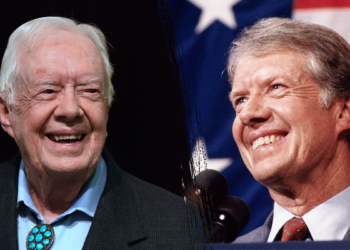
President Jimmy Carter ‘s legacy of giving back endures in several nonprofits he and his wife, Rosalynn Carter, supported for the almost 50 years after they left the White House.
In Los Angeles on Monday, members of Habitat for Humanity of Greater Los Angeles signed wooden two-by-fours that will be used in a new house as a tribute to the former president, who died at age 100 on Dec. 29. In Houston, they are planning to let members of the community sign a door and wall in a new house to remember the thousands of homes the Carters helped build. They will do the same in Tallahassee, Florida, and numerous other communities, in preparation for Carter’s state funeral on Jan. 9.
The tributes to his dedication to providing affordable housing show how the Carters’ work will continue.
The couple established The Carter Center in 1982 with a mission to help resolve conflicts, which expanded to advocating for democracy and eliminating treatable diseases like Guinea worm.
The center’s observers have monitored some 125 elections in 40 countries and three tribal nations, with Carter himself traveling to places like Nepal, Bolivia and Zimbabwe to mediate political agreements and advocate for free and fair elections. In 2002, he won a Nobel Peace Prize for his and the center’s work resolving conflicts and fighting for human rights.
“In so many ways, he set the standard for how presidents should be in their post-presidency, as someone who is going to continue to do good, someone who’s going to continue to positively impact society,” said presidential historian Cassandra Newby-Alexander, professor of Virginia Black history and culture at Norfolk State University,
Carter’s giving came in the form of his seemingly ceaseless personal effort to use his stature and presence to rally resources and attention to his causes.
In 1986, Carter responded to a recommendation from the U.S. Centers for Disease Control and Prevention to eradicate Guinea worm and The Carter Center has been working to do so ever since.
“To the demise of the worm” was the catchphrase, according to Dr. Jordan Tappero, deputy director for neglected tropical diseases at the Bill & Melinda Gates Foundation, which is The Carter Center’s largest funder having donated $292.5 million since 2000.
The number of Guinea worm cases has fallen from 3.5 million when the center started to 14 human cases across four African nations in 2023, according to The Carter Center. Carter had hoped to outlive the worm, which while rarely fatal, causes great pain and suffering to those infected.
The Carters also nurtured a forty-year relationship with the nonprofit Habitat for Humanity, which builds and refurbishes homes.
“It was a tiny organization in 1984 when President and Mrs. Carter went up with a busload of volunteers from southwest Georgia to help rehab a tenement building on the Lower East Side of Manhattan,” said Jonathan Reckford, CEO of Habitat for Humanity International, in an interview in 2023.
Carter repeatedly said that working with the organization was a way he put his Christian faith into action, Reckford recalled. He said Carter was a skilled carpenter, who was also famous for his work ethic on site.
They would joke that, “it’s not a competition as long as his house gets finished first,” Reckford said of the former president. “And you did not want to get that submarine commander glare if he thought you weren’t working hard enough.”
Habitat for Humanity now works in 70 countries and reported that some 910,000 people volunteered with them in 2023. Some 4,447 homes in 14 countries have been built through the Carter Work Project, according to Habitat.
Cleora Taylor met the Carters in August 2018 when they helped build 41 new homes in South Bend and Mishawaka, Indiana. Taylor recalled how the former president greeted her by name and knew about her children, including her daughter, who was 11 at the time and has autism.
“It means so much to me that he knew me,” said Taylor, speaking in 2023 from her living room in the home the Carters helped her build, on a street named Carter Court.
“I was born in 82, so I’m like, I think this is going to be a big deal,” she said, when she found out the home she now owns would be built alongside the former president. “This is a big opportunity for my kids and I to be a part of this.”
Rosalynn Carter, who died in 2023, was long an advocate for mental health support while her husband held political offices, and also campaigned for the recognition of the work of caregivers.
“There are only four kinds of people in this world,” the former first lady is often quoted as saying. “Those who have been caregivers; those who are currently caregivers; those who will be caregivers, and those who will need caregivers.”
In 1987, she established the nonprofit now called the Rosalynn Carter Institute for Caregivers that advocates for caregivers and offers support to people caring for others in their lives. Philanthropist Melinda French Gates pledged to match up to $500,000 in donations to the institute for GivingTuesday in December. Her organization Pivotal said $253,000 was raised for RCI in the campaign.
Originally Published:






